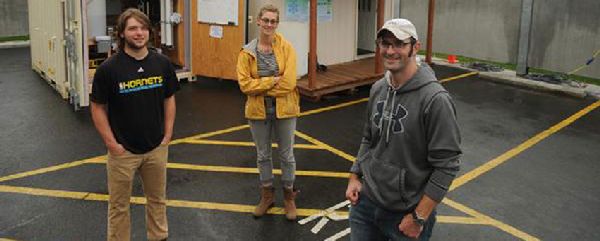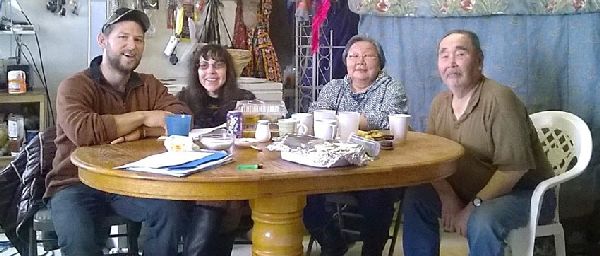Alaska Water and Sewer Challenge
Teams and communities THAT participatED in Phase 3: Prototype Development & Pilot Testing, Fall 2015 – Fall 2017
University of Alaska Anchorage
The University of Alaska Anchorage (UAA) led a team of academics, engineering consultants and health professionals in developing a technology suitable for in-home water reuse for non-potable purposes. UAA partnered with two rural communities, Kipnuk and Koyukuk, to gather feedback that will inform the design of UAA’s proposed water and sewer design. The demonstration system was located behind the Engineering & Industry Building on UAA campus. System design, progress and other details are shared publicly at http://www.reusewaterak.com

DOWL Alaska
The DOWL team was comprised of experts with international and arctic experience in water and sanitation technologies in underserved communities. A key component of the DOWL team involved “co-developing” proposed technologies with significant user input. For that purpose, DOWL partnered with three rural communities, Tununak, Shishmaref and Kwigillingok. Among DOWL's team members were a technical designer with patented in-home water treatment systems and international expertise in point-of-use drinking water filtration, an anthropologist with expertise in social science techniques for community public health projects, arctic engineers with expertise in realistic end user operations and maintenance capabilities, and a project manager that has led dozens of international teams in implementing water and sanitation technologies in underserved communities.

Summit Consulting Services
Summit Consulting Services is an Alaska engineering firm that assists in the evaluation, planning, design and construction of water and waste water systems. Headquartered south of Tok, Summit’s approach was based on their decades of experience developing practical sanitation solutions for rural Alaska. The burn box and automatic air vent for the Flush Tank and Haul systems are two of their innovative contributions to Alaska water, wastewater and sanitation infrastructure. The Summit team’s proposed system for the Alaska Water Sewer Challenge was intended to be flexible and modifiable to meet the needs and capabilities of the individual homeowner and to be installed and maintained with a local labor force. Summit has decades of experience working with tribal and city governments to hire local labor forces for construction projects using the force account method. Summit’s prototype system lived within an off-grid “cabin lab” to replicate homes in rural Alaska. The system is completely within the home to take advantage of the home’s existing heating, allow the homeowner easier access to the system’s parts, and to avoid a connection to an outbuilding that might rupture as unstable soils shift variably from the main home. This team was focused on improving the ease of sanitation for the end user by reducing the amount of water hauled and incorporating sources such as a rain water catchment system. Summit’s system included freeze-thaw capabilities and the flexibility to upscale or downscale water storage within the home as necessary. Other features they trialed were intended to be flexible and tailored to a family’s needs, including: a low-flow or dry-toilet option, addition of a utility sink for dirtier wash purposes, and an optional dishwasher. Summit teamed up with Agnew::Beck Consulting, an Alaska based community planning and development firm, to assist with engaging partner communities in the system’s design and acceptance. Agnew::Beck has worked with rural villages in all regions of the state to improve health, develop rural infrastructure, complete plans and secure project funding. The Re-Locate organization brought to the team multiple years of working with the community of Kivalina to address the intersection of water and relocation. During Phase 3, Re-Locate was working to install a biochar reactor to burn solid waste from dry toilets that were piloting in Kivalina. Kivalina and Kongiganak are the two partner communities on Summit’s team.

Teams that participated in Phase 2: Proposal Development & Presentation, Fall 2014 – Summer 2015
The six highest ranking teams selected in Phase 1 developed household water and sewer systems to meet specific financial and technical performance targets. Some targets included capital, operating and maintenance costs; quantity of water to be delivered by the system; availability of replacement parts, and capability for freeze/thaw recovery.
Cowater Alaska
Cowater provides and installs small, decentralized water and wastewater solutions to remote Arctic communities in Alaska. Cowater has teamed up with two other Alaska based firms, Zender Environmental Health Research Group and Garness Engineering. Together, these firms combine decades of experience working with solid waste, environmental, and civil engineering projects for villages. The team has leading expertise with decentralized onsite water and wastewater treatment systems, development of solutions using sustainable non-traditional approaches to address water and sewer needs at the household level, evaluation of public acceptance of health-related technologies at home, and incorporation of input from end users into the development of new technologies.
DOWL Alaska
Dowl is a large national engineering firm with several offices in Alaska. Dowl's project manager has led dozens of international teams in implementing water and sanitation technologies, targeting realistic end user operations and maintenance objectives in underserved communities. Among their team members are the primary author of the Cold Regions Utility Monograph with expertise in development and use of in-home sanitation units for Arctic environments, an international expert in social science techniques for community public health projects, a leader in 'Design Thinking' who has implemented such methods on water and sanitation projects in developing countries, and a cold regions engineer with over 30 years of design and construction experience in remote Alaskan communities.
Lifewater
Based in Fairbanks, Alaska, Lifewater is an engineering company which has developed and patented a packaged residential wastewater treatment system suitable for extreme weather, having over 100 systems operating in about 20 rural communities since 1999. Lifewater's partners include CampWater Industries, another Alaska firm, the Cold Climate Housing Research Center of the University of Alaska Fairbanks, and AppTech Solutions, a patent-holder innovative company that has worked in conjunction with the Bill & Melinda Gates Foundation's "Build a Better Toilet".
Summit Consulting
Summit Consulting is an Alaska engineering firm that assists in the evaluation, planning, design and construction of water and waste water systems. Among team members are the developer of an automatic air vent for Flush Tank and Haul systems used in some villages, a finalist of the Gates Foundation 'Dry Toilet' competition who developed a prototype reactor to convert human solid waste to biochar without grid power or water, and the principal coordinator at the European Union for funding the implementation of 'resources-oriented' sanitation concepts in Eastern African countries during 2006-2010. Summit has also teamed up with a facilitation firm Agnew::Beck Consulting that has worked for 17 years with rural villages to perform community engagement, assist with 'design thinking' and evaluate community acceptance of water and sewer technologies at the household level.
Tetra Tech
Tetra Tech is a national engineering firm with an office in Alaska. The team also includes the University of Alberta's Water Initiative for First Nations, the Institute for Sustainable Futures of the University of Technology in Sydney, and the CRW Engineering Group, an Anchorage engineering firm with a deep understanding of rural Alaska communities.
University of Alaska Anchorage
University of Alaska Anchorage (UAA) has assembled a large team that features a variety of expertise ranging from leaders in academia, non-profit institutions and the private sector. Partners include a University of Colorado-Boulder Principal Investigator working on a "Reinvent the Toilet" grant for innovative sanitation technologies, experts from RES'EAU WaterNET and Dalhousie University who have engaged rural Canadian communities in utilizing the concept of "design thinking," and a patent holder who developed wastewater reclamation and reuse technologies for the U.S. Army and NASA and who is currently associated with the University of Southern California. The team also includes the Alaska Native Tribal Health Consortium, with expertise in evaluating point-of-use (POU) water treatment and safe water storage in rural settings, and a research pioneer from the University of North Carolina, who led the design and construction of an improved POU ceramic pot water filter and portable hand-washing stations.
Joint Ventures formed in Phase 1: Team Formation, Fall 2013 – Spring 2014
- Advanced Water Technologies dba Better Waters
- Arctic Engineering Supply
- COWATER Alaska
- DOWL Alaska
- E3 environmental
- ERM Environmental Resources Management
- ILF Consultants
- Larsen Consulting Group
- LIFEWATER Engineering
- Summit Consulting Services
- Team Eco Waters/BI Pure Water
- Terragon Environmental Technologies
- Tetra Tech
- University of Alaska Anchorage
- Yukon-Kuskokwim Health Corporation

 Indicates an external site.
Indicates an external site.